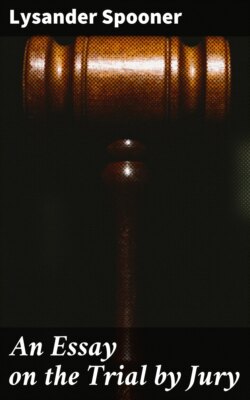Читать книгу An Essay on the Trial by Jury - Lysander Spooner - Страница 5
На сайте Литреса книга снята с продажи.
Footnotes
ОглавлениеTable of Contents
[1] To show that this supposition is not an extravagant one, it may be mentioned that courts have repeatedly questioned jurors to ascertain whether they were prejudiced against the government—that is, whether they were in favor of, or opposed to, such laws of the government as were to be put in issue in the then pending trial. This was done (in 1851) in the United States District Court for the District of Massachusetts, by Peleg Sprague, the United States district judge, in empanelling three several juries for the trials of Scott, Hayden, and Morris, charged with having aided in the rescue of a fugitive slave from the custody of the United States deputy marshal. This judge caused the following question to be propounded to all the jurors separately; and those who answered unfavorably for the purposes of the government, were excluded from the panel.
"Do you hold any opinions upon the subject of the Fugitive Slave Law, so called, which will induce you to refuse to convict a person indicted under it, if the facts set forth in the indictment, and constituting the offence, are proved against him, and the court direct you that the law is constitutional?"
The reason of this question was, that "the Fugitive Slave Law, so called," was so obnoxious to a large portion of the people, as to render a conviction under it hopeless, if the jurors were taken indiscriminately from among the people.
A similar question was soon afterwards propounded to the persons drawn as jurors in the United States Circuit Court for the District of Massachusetts, by Benjamin R. Curtis one of the Justices of the Supreme Court of the United States, in empanelling a jury for the trial of the aforesaid Morris on the charge before mentioned; and those who did not answer the question favorably for the government were again excluded from the panel.
It has also been an habitual practice with the Supreme Court of Massachusetts, in empanelling juries for the trial of capital offences, to inquire of the persons drawn as jurors whether they had any conscientious scruples against finding verdicts of guilty in such cases; that is, whether they had any conscientious scruples against sustaining the law prescribing death as the punishment of the crime to be tried; and to exclude from the panel all who answered in the affirmative.
The only principle upon which these questions are asked, is this—that no man shall be allowed to serve as juror, unless he be ready to enforce any enactment of the government, however cruel or tyrannical it may be.
What is such a jury good for, as a protection against the tyranny of the government? A jury like that is palpably nothing but a mere tool of oppression in the hands of the government. A trial by such a jury is really a trial by the government itself—and not a trial by the country—because it is a trial only by men specially selected by the government for their readiness to enforce its own tyrannical measures.
If that be the true principle of the trial by jury, the trial is utterly worthless as a security to liberty. The Czar might, with perfect safety to his authority, introduce the trial by jury into Russia, if he could but be permitted to select his jurors from those who were ready to maintain his laws, without regard to their injustice.
This example is sufficient to show that the very pith of the trial by jury, as a safeguard to liberty, consists in the jurors being taken indiscriminately from the whole people, and in their right to hold invalid all laws which they think unjust.
[2] The executive has a qualified veto upon the passage of laws, in most of our governments, and an absolute veto, in all of them, upon the execution of any laws which he deems unconstitutional; because his oath to support the constitution (as he understands it) forbids him to execute any law that he deems unconstitutional.
[3] And if there be so much as a reasonable doubt of the justice of the laws, the benefit of that doubt must be given to the defendant, and not to the government. So that the government must keep its laws clearly within the limits of justice, if it would ask a jury to enforce them.
[4] Hallam says, "The relation established between a lord and his vassal by the feudal tenure, far from containing principles of any servile and implicit obedience, permitted the compact to be dissolved in case of its violation by either party. This extended as much to the sovereign as to inferior lords. * * If a vassal was aggrieved, and if justice was denied him, he sent a defiance, that is, a renunciation of fealty to the king, and was entitled to enforce redress at the point of his sword. It then became a contest of strength as between two independent potentates, and was terminated by treaty, advantageous or otherwise, according to the fortune of war. * * There remained the original principle, that allegiance depended conditionally upon good treatment, and that an appeal might be lawfully made to arms against an oppressive government. Nor was this, we may be sure, left for extreme necessity, or thought to require a long-enduring forbearance. In modern times, a king, compelled by his subjects' swords to abandon any pretension, would be supposed to have ceased to reign; and the express recognition of such a right as that of insurrection has been justly deemed inconsistent with the majesty of law. But ruder ages had ruder sentiments. Force was necessary to repel force; and men accustomed to see the king's authority defied by a private riot, were not much shocked when it was resisted in defence of public freedom."—3 Middle Ages, 240–2.
